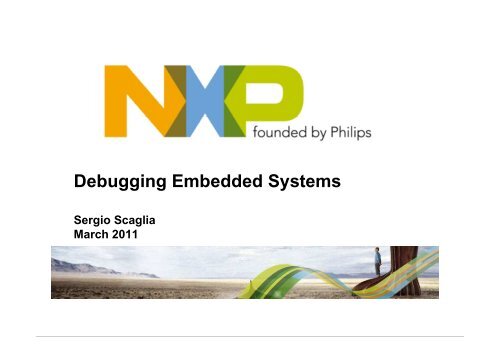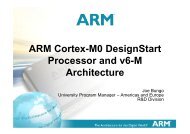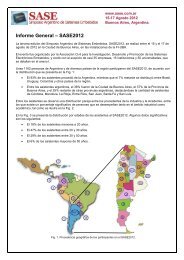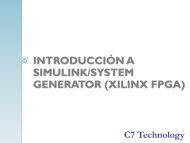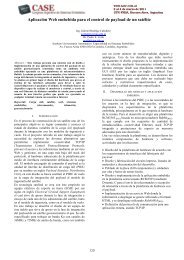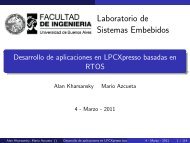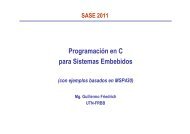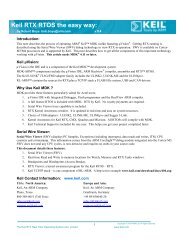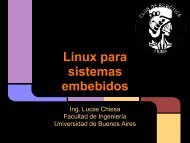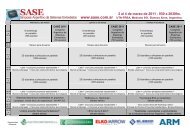You also want an ePaper? Increase the reach of your titles
YUMPU automatically turns print PDFs into web optimized ePapers that Google loves.
<strong>Debugging</strong> <strong>Embedded</strong> <strong>Systems</strong><br />
Sergio Scaglia<br />
March 2011
Agenda<br />
What is Debug?<br />
<strong>Debugging</strong> <strong>Embedded</strong> <strong>Systems</strong><br />
GDB/MI Interface<br />
GDB Remote Serial Protocol<br />
JTAG Overview<br />
ARM Debug Architecture v5<br />
SWD Protocol<br />
Debug+ETM Connectors<br />
Debug Session Example<br />
2
<strong>Debugging</strong> <strong>Embedded</strong> <strong>Systems</strong><br />
What is Debug?<br />
<strong>Debugging</strong> <strong>Embedded</strong> <strong>Systems</strong><br />
GDB/MI Interface<br />
GDB Remote Serial Protocol<br />
3
What is Debug?<br />
Debug is a Science or an Art?<br />
The Principle of Confirmation:<br />
Debug is the process of confirming, one by one, that the many things we<br />
believed (or assumed) to be true about the code, actually are true.<br />
Finding one of the assumptions is not true, we found a bug.<br />
<strong>Debugging</strong> Techniques:<br />
Adding Trace Code to the program to print out messages or values of<br />
variables, as the program executes (using printf() for example).<br />
Using a <strong>Debugging</strong> Tool (such as GNU GDB).<br />
4
Debuggers vs Front-Ends<br />
Debuggers:<br />
– Computer program used to test and debug other programs (the “Target”<br />
program). Example: GNU GDB<br />
Front-Ends:<br />
– Computer programs that monitor and control a Debugger program (those<br />
that only present a Command Line Interface), allowing the users to debug<br />
their programs using a GUI-based environment. Examples: DDD, Eclipse,<br />
Insight<br />
Text-based vs GUI-based Tools<br />
In general, GUI-based tools are more convenient and efficient from the user<br />
point of view.<br />
Front-Ends are limited to the back-end features.<br />
In some cases (such as debugging GUI applications, quick checks) textbased<br />
tools are preferred (no clashes, lower startup time).<br />
5
GNU GDB Screenshot<br />
6
DDD Screenshot<br />
7
Eclipse (Debug perspective) Screenshot<br />
8
Insight Screenshot<br />
9
Debugger: Main Operations<br />
Stepping Through the Source Code<br />
Run<br />
Next<br />
Step (inside functions call)<br />
Continue<br />
Breakpoints<br />
Break<br />
TBreak<br />
Inspecting Variables<br />
Print<br />
10
Debugger: Main Operations (Cont.)<br />
Detecting Changes in the Variables (Watchpoints)<br />
(Breakpoint + Variable Inspection)<br />
Watch var<br />
Watch (var > 100)<br />
Inspecting the Call Stack<br />
Frame 1<br />
Up / Down<br />
BackTrace<br />
(Stack stores function’s local variables, parameters, and location from<br />
which the function was called)<br />
11
<strong>Debugging</strong> <strong>Embedded</strong> <strong>Systems</strong> – Typical Scenario<br />
Mi interface<br />
Remote Serial Protocol<br />
(TCP connection)<br />
JTAG/SWD Protocol<br />
USB/Ethernet<br />
12
GDB/MI Interface<br />
Command Line Interface displays human-oriented messages.<br />
GDB/MI is a line based machine oriented text interface to GDB.<br />
It is specifically intended to support the development of systems which use<br />
the debugger as just one small component of a larger system (Front-Ends,<br />
IDEs, etc)<br />
CLI commands are still accepted.<br />
It’s activated using the –i mi command line option:<br />
Example: arm-none-eabi-gdb.exe -i mi -x rom.gdb timer.elf<br />
GDB/MI Input Syntax<br />
[ token ] "-" operation ( " " option )* [ " --" ] ( " " parameter )* nl<br />
Example:<br />
-stop<br />
0123-break-insert –h main<br />
-break-list<br />
-exec-continue<br />
13
GDB/MI Interface (Cont.)<br />
GDB/MI Output Syntax<br />
output -><br />
( out-of-band-record )* [ result-record ] "(gdb)" nl<br />
result-record -><br />
[ token ] "^" result-class ( "," result )* nl<br />
out-of-band-record -><br />
async-record | stream-record<br />
async-record -><br />
exec-async-output | status-async-output | notify-async-output<br />
exec-async-output -><br />
[ token ] "*" async-output<br />
status-async-output -><br />
[ token ] "+" async-output<br />
notify-async-output -><br />
[ token ] "=" async-output<br />
async-output -><br />
async-class ( "," result )* nl<br />
result-class -><br />
"done" | "running" | "connected" | "error" | "exit"<br />
14
GDB/MI Interface (Cont.)<br />
GDB/MI Output Syntax (Cont.)<br />
async-class -><br />
"stopped" | others (where others will be added depending on the needs|this<br />
is still in development).<br />
result -> variable "=" value<br />
variable -> string<br />
value -> const | tuple | list<br />
const -> c-string<br />
tuple -> "{}" | "{" result ( "," result )* "}"<br />
list -> "[]" | "[" value ( "," value )* "]" | "[" result ( "," result )* "]"<br />
stream-record -><br />
console-stream-output | target-stream-output | log-stream-output<br />
console-stream-output -><br />
"~" c-string<br />
target-stream-output -><br />
"@" c-string<br />
log-stream-output -><br />
"&" c-string<br />
nl -> CR | CR-LF<br />
token -> any sequence of digits.<br />
15
GDB/MI Interface (Cont.)<br />
GDB/MI Output Syntax (Cont.)<br />
Notes:<br />
status-async-output contains on-going status information about the progress<br />
of a slow operation. It can be discarded. All status output is prefixed by `+'.<br />
exec-async-output contains asynchronous state change on the target<br />
(stopped, started,disappeared). All async output is prefixed by `*'.<br />
notify-async-output contains supplementary information that the client should<br />
handle (e.g., a new breakpoint information). All notify output is prefixed by `='.<br />
console-stream-output is output that should be displayed as is in the console.<br />
It is the textual response to a CLI command. All the console output is prefixed<br />
by `~'.<br />
target-stream-output is the output produced by the target program. All the<br />
target output is prefixed by `@'.<br />
log-stream-output is output text coming from gdb's internals, for instance<br />
messages that should be displayed as part of an error log. All the log output is<br />
prefixed by `&'.<br />
16
GDB/MI Interface (Cont.)<br />
GDB/MI Output Records<br />
Result Records<br />
The response to a GDB/MI command includes one of the following result indications:<br />
"^done" [ "," results ]<br />
The synchronous operation was successful, results are the return values.<br />
"^running"<br />
The asynchronous operation was successfully started. The target is running.<br />
"^connected"<br />
gdb has connected to a remote target.<br />
"^error" "," c-string<br />
The operation failed. The c-string contains the corresponding error message.<br />
"^exit"<br />
gdb has terminated.<br />
17
GDB/MI Interface (Cont.)<br />
GDB/MI Output Records (Cont.)<br />
Stream Records<br />
The gdb internally maintains a number of output streams: the console, the target, and<br />
the log. The output intended for each of these streams is funneled through the gdb/mi<br />
interface using stream records:<br />
"~" string-output<br />
The console output stream contains text that should be displayed in the CLI<br />
console window. It contains the textual responses to CLI commands.<br />
"@" string-output<br />
The target output stream contains any textual output from the running target. This<br />
is only present when GDB's event loop is truly synchronous, which is currently only<br />
the case for remote targets.<br />
"&" string-output<br />
The log stream contains debugging messages being produced by gdb's internals.<br />
18
GDB/MI Interface (Cont.)<br />
GDB/MI Output Records (Cont.)<br />
Async Records<br />
They are used to notify the gdb/mi client of additional changes that have occurred.<br />
Those changes can either be a consequence of gdb/mi commands (e.g., a<br />
breakpoint modified) or a result of target activity (e.g., target stopped).<br />
*running,thread-id="thread“<br />
*stopped,reason="reason“<br />
(some example of reasons; breakpoint-hit, watchpoint-trigger, function-finished,<br />
exited-normally, signal-received)<br />
=thread-created,id="id"<br />
=thread-exited,id="id"<br />
19
GDB/MI Interface (Cont.)<br />
GDB/MI Examples:<br />
Setting a Breakpoint:<br />
Program Execution:<br />
20
GDB/MI Interface (Cont.)<br />
GDB/MI Examples: (Cont.)<br />
Bad Command:<br />
Quitting GDB:<br />
21
<strong>Debugging</strong> <strong>Embedded</strong> <strong>Systems</strong> – Typical Scenario<br />
Mi interface<br />
Remote Serial Protocol<br />
(TCP connection)<br />
JTAG/SWD Protocol<br />
USB/Ethernet<br />
22
GDB Remote Serial Protocol<br />
GDB Remote Serial Protocol allows GDB to connect to any target remotely.<br />
GDB implements the RSP client side, while the target side needs to<br />
implement the RSP Server (for example; GDB Server)<br />
Communication channel for RSP can be a Serial or TCP/IP connection.<br />
RSP Packet format:<br />
Packet Acknowledgement<br />
Interrupt<br />
Each packet should be acknowledged with a single character:<br />
‘+’ to indicate satisfactory reply<br />
‘-’ to indicate failure and request retransmission<br />
GDB can interrupt the server transmitting character 0x03 between packets.<br />
GDB Server can ignore the interrupts.<br />
23
GDB Remote Serial Protocol (Cont.)<br />
RSP Packets (Standard Remote Debug)<br />
24
GDB Remote Serial Protocol (Cont.)<br />
RSP Packets in the remote target command<br />
25
GDB Remote Serial Protocol (Cont.)<br />
RSP Packets in the load command<br />
26
GDB Remote Serial Protocol (Cont.)<br />
RSP Packets in the step command<br />
27
GDB Remote Serial Protocol (Cont.)<br />
RSP session capture, showing the S command:<br />
28
<strong>Debugging</strong> <strong>Embedded</strong> <strong>Systems</strong><br />
JTAG Overview<br />
ARM Debug Architecture v5<br />
SWD Protocol<br />
Debug+ETM Connectors<br />
29
<strong>Debugging</strong> <strong>Embedded</strong> <strong>Systems</strong> – Typical Scenario<br />
Mi interface<br />
Remote Serial Protocol<br />
(TCP connection)<br />
JTAG/SWD Protocol<br />
USB/Ethernet<br />
30
IEEE 1149.1 (JTAG) Overview<br />
Originally designed for Boundary Scan Tests (used for testing IC’s<br />
interconnects at PCB level)<br />
Also used to access sub-blocks of integrated circuits and to debug<br />
<strong>Embedded</strong> <strong>Systems</strong>.<br />
31
IEEE 1149.1 (JTAG) Overview<br />
The JTAG ecosystem begins with IC designers embedding test logic in each chip and<br />
connecting internal registers in the chip to JTAG scan chains. The hardware components<br />
of IEEE 1149.1 consist of:<br />
• TAPs. Four mandatory pins are: TDI (test data in), TDO (test data out), TMS (test mode<br />
select), and TCK (test clock). An optional TRST/reset pin is also defined. When driven<br />
low, it resets the internal state machine.<br />
• TAP controller: A finite state machine with 16 states with TMS and TCK as its inputs.<br />
Outputs include ClockDR, UpdateDR, shiftDR, ClockIR, UpdateIR, ShiftIR, Select, Enable,<br />
TCK, and the optional TRST.<br />
• Instruction register.<br />
• Test data register.<br />
Test engineers use these structures as the access points for built-in self-test (BIST).<br />
Together, JTAG and BIST are widely used to deploy low overhead embedded test<br />
solutions that detect static faults such as shorts, opens, and logic errors.<br />
– For software debugging, design engineers use an in-circuit emulator to access an on-chip<br />
debug module, which is integrated into the CPU over the JTAG interface. This debug<br />
module provides software developers the ability to load, run, halt, and step the CPU.<br />
32
JTAG TAP Controller State-Machine<br />
33
JTAG Interface signals<br />
34
JTAG Shortcomings<br />
Not specifically designed for <strong>Debugging</strong> <strong>Embedded</strong> <strong>Systems</strong><br />
The 4-pin connector makes it inconvenient for some low pin-count<br />
packages.<br />
Daisy-chaining is intolerant to a debug component (especially when a TAP<br />
is removed as a result of power management)<br />
35
Serial Wire Debug – A new approach<br />
To address the issues with JTAG, a new packet-based protocol was<br />
develop: Serial Wire Debug (SWD).<br />
ARM designed a new debug architecture (CoreSight) taking into account<br />
the requirements for Debug and Trace. SWD was designed with this new<br />
debug architecture in mind.<br />
36
ARM CoreSight Debug Architecture Overview<br />
Bus-based approach (instead of the serial scan interface) for onchip<br />
debug control and access. Advantages:<br />
It permits debug access while the CPU is running.<br />
Debug access is more abstract, less CPU-specific and more scalable.<br />
Provides advantage for SoCs that consist on multiple IP blocks from<br />
multiple vendors, often using multiple clock and power domains.<br />
Register-based access to debug configuration and status<br />
information.<br />
CPU can also access this registers, giving additional flexibility.<br />
Star Topology of the bus, providing true power and clock isolation.<br />
New ARM Debug Interface v5 (ADIv5) implements CoreSight<br />
architecture.<br />
The Debug Access Port (DAP) decouples the external debug<br />
interface (JTAG or SWD) from the internal bus-based debug and<br />
trace infrastructure.<br />
37
Debug Access Port structure<br />
The DAP bus has a single master (Debug Port) and one or more<br />
Slaves ( Access Ports) which are typically used to interface to the<br />
various on-chip bus standards, or to provide dedicated debug<br />
features<br />
38
Debug Access Port components<br />
AP (Access Ports) which can access various slaves devices:<br />
JTAG-AP: legacy JTAG cores<br />
MEM-AP for system memory (for example, the AHB-AP for Advanced Highperformance<br />
Bus)<br />
MEM-AP for bus-based debug functionality (for example, APB-AP for Advanced<br />
Peripheral Bus)<br />
Other debug or control devices.<br />
Serial Wire/JTAG Debug Port (SWJ-DP)<br />
It provides a mechanism to select between JTAG and SWD interfaces<br />
Data signal SWDIO and clock SWCLK can be overlaid on the JTAG TMS and<br />
TCK pins (thus, both SWD and JTAG can share same connector)<br />
39
SWJ-DP<br />
JTAG is selected by default, enabling legacy devices continue working as<br />
normal.<br />
SWD protocol is selected sending a specific sequence on TMS (switching<br />
protocol).<br />
40
Debug Access Port accesses description<br />
DAP accesses<br />
– DAP bus has a single master (Debug Port) and one or more Slaves (<br />
Access Ports) which are typically used to interface to the various onchip<br />
bus standards, or to provide dedicated debug features.<br />
– Each transaction sent from the external debugger is addressed to a<br />
single one of these components (the DP or an AP).<br />
AP accesses<br />
– Each AP provides up to 64 32-bit registers (arranged in 16 banks of 4).<br />
– One register identifies the particular AP type.<br />
– In a MEM-AP, a couple of registers are used for Address and Data.<br />
DP accesses<br />
– Registers in the DP are used to provide control and status of the<br />
external link (SWD).<br />
– The DP also has registers to select the current AP, and the register<br />
bank within that AP.<br />
Note: Sticky bits are used to signal when some error conditions occur.<br />
41
Implementation Example: Debug Access Port (JTAG-DP accesses to an AP)<br />
42
Breakpoints: Hardware vs Software<br />
Hardware Instructions Breakpoints (requires specific hardware support)<br />
– Provided by comparators called Watchpoint units<br />
– Watchpoint units can be programmed to detect data accesses and instruction<br />
fetches by monitoring Address bus, Data bus and control signals.<br />
– When a match occurs, the core is forced into Debug state.<br />
43
Breakpoints support<br />
Software Instructions Breakpoints<br />
– It replaces the instruction code where the Breakpoint is set, by an special<br />
instruction (SW Interrupt) which causes the processor to attend a special<br />
handler routine (reserved for Debug).<br />
– Only can be used when running from code from RAM<br />
– No limit (in theory) in the number of software breakpoints that can be used.<br />
Original BKPT<br />
Instruction<br />
44
<strong>Debugging</strong> <strong>Embedded</strong> <strong>Systems</strong> – Typical Scenario<br />
Mi interface<br />
Remote Serial Protocol<br />
(TCP connection)<br />
JTAG/SWD Protocol<br />
USB/Ethernet<br />
45
SWD Protocol<br />
Each (successful) SWD transfer consist of 3 parts:<br />
A Header (sent from the Host)<br />
An Acknowledgement from the Target (if it recognizes the header)<br />
A Data Payload (provided by the Host in a Write, or by the Target in a Read)<br />
46
SWD Protocol – Header fields<br />
Header fields description:<br />
Start: A single start bit, with value 1.<br />
APnDP: A single bit, indicating if DP or AP is accessed (0=DP, 1=AP)<br />
RnW: A single bit, indicating Read or a Write access (0=Write, 1=Read).<br />
A[2:3]: Two bits used to address internal register in DP or AP (transmitted LSB<br />
first on the wire).<br />
Parity: A single parity bit (even parity).<br />
Stop: A single stop bit, with value 0.<br />
Park: A single bit where the Host does not drive the line. The line is pulled High<br />
by the SWD interface hardware. Target reads this bit as 1.<br />
Trn: Turnaround. The line is not driven and the state of the line is undefined.<br />
The length is controlled by the TURNROUND field in the Wire Control Register.<br />
Default value; one clock cycle.<br />
47
SWD Protocol – Acknowledgement and Data fields<br />
Acknowledgement field:<br />
ACK[0:2]: A 3-bit target-to-host response (transmitted LSB first on the wire)<br />
100: OK response<br />
010: WAIT response<br />
001: FAULT response<br />
Data Payload:<br />
WDATA[0:31]:<br />
RDATA[0:31]:<br />
Parity:<br />
32 bits of write data, from host to target (transmitted LSB first<br />
on the wire).<br />
32 bits of read data, from target to host (transmitted LSB first<br />
on the wire).<br />
A single even-parity bit calculated over the data bits.<br />
48
SWD Protocol – Timing relationship<br />
SWDIO and SWCLK timing relationship in a Read transfer:<br />
49
SWD – Transfer examples<br />
Successful Write Operation (OK response)<br />
Successful Read Operation (OK response)<br />
50
SWD – Transfer examples<br />
WAIT response to Read or Write Operation<br />
FAULT response to Read or Write Operation<br />
51
Connector Types – JTAG Debug (legacy)<br />
A 20-pin IDC connector is used for Debug<br />
52
Connector Types – ETM Trace (legacy)<br />
A 38-pin MICTOR connector is used for Trace<br />
53
Connector Types – Cortex Debug connector<br />
A 10-pin connector is used for Cortex Debug<br />
54
Connector Types – Cortex Debug+ETM connector<br />
A 20-pin connector is used for Debug+Trace<br />
55
<strong>Debugging</strong> <strong>Embedded</strong> <strong>Systems</strong> – Typical Scenario<br />
Mi interface<br />
Remote Serial Protocol<br />
(TCP connection)<br />
JTAG/SWD Protocol<br />
USB/Ethernet<br />
56
<strong>Debugging</strong> <strong>Embedded</strong> <strong>Systems</strong><br />
Debug Session Example<br />
57


